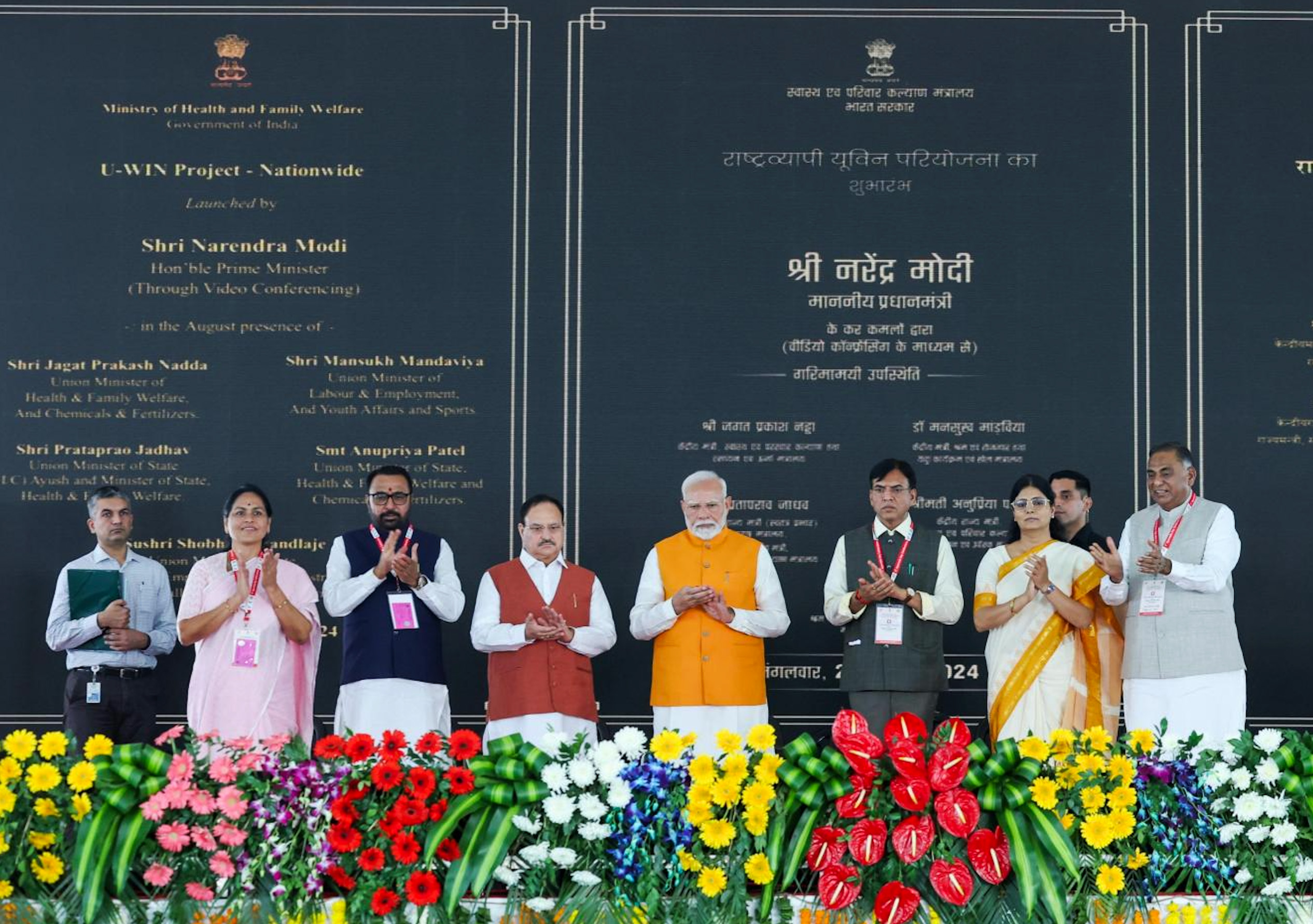
Rajeshwari with her two month old daughter at the Bamboo Flat Primary Health Centre
“Vaccination is no longer a hassle,” says a beaming Rajeshwari as she rocks her two-month-old daughter to sleep, enjoying the cool sea breeze flowing across the Andaman Sea. The 26-year-old is awaiting her turn at the Bamboo Flats Primary Health Centre, located on one of the thousand pristine islands of the Andaman and Nicobar archipelago off India’s eastern coast.
India’s Universal Immunization Programme (UIP) is vast, serving nearly 30 million pregnant women and 27 million newborns annually. It protects them against 12 preventable diseases, such as measles, diphtheria, and polio, which can severely impact a child’s health and well-being. Despite its scale, ensuring timely vaccination and preventing dropouts remain significant challenges, often resulting in preventable deaths or debilitating conditions. According to the World Health Organization, vaccines are the most cost-effective way to combat such diseases, saving over 150 million lives globally each year—equivalent to six lives every minute.

India's universal immunization programme (UIP) serves nearly 30 million pregnant women and 27 million newborns annually
In India, digital technologies are bridging gaps in healthcare delivery, including vaccinations. These solutions are tailored to specific programs and populations while integrating with other systems to drive effective last-mile impact. UNDP India has been at the forefront of these efforts through its Health System Strengthening (HSS) portfolio.
For Rajeshwari, these innovations brought peace of mind. She and her family were planning to relocate to a different city for better career opportunities, but concerns about continued vaccination services for her daughter in an unfamiliar place were troubling.
This is where U-WIN, a name-based immunization registry that ensures “anywhere access, anytime vaccination,” came to her rescue. U-WIN allows healthcare workers to retrieve the vaccination records of any registered child or pregnant woman, ensuring uninterrupted services across the country.

Launch of U-WIN
Launched by the Hon’ble Prime Minister of India in 2024, U-WIN simplifies the vaccination process with its user-friendly design. Pregnant women, parents, or guardians can self-register via the U-WIN app or portal or visit the nearest vaccination center to register. The system tracks the immunization status of every child and pregnant woman from the day of registration. Healthcare workers can monitor important vaccinations for pregnant women, record delivery outcomes, and initiate the newborn’s vaccination schedule, which is tracked until the child turns 16.
Since its launch, U-WIN has registered over 19 million pregnant women and 58 million children and tracked more than 292 million vaccine doses in real time (as of December 2024). Built on the foundations of Co-WIN, the backbone of India’s COVID-19 vaccination program, U-WIN is set to become the world’s largest digital immunization registry.
India’s modernization of its immunization landscape began over a decade ago with the electronic Vaccine Intelligence Network (eVIN). eVIN mapped vaccine supply chains to ensure timely delivery to health centers while maintaining storage efficacy. It now supports nearly 30,000 health centers across the country, preventing vaccine wastage and ensuring availability, even in the most remote areas.

EVIN supports nearly 30000 health centers across the country mapping Vaccine supply chains to ensure timely delivery of vaccines while maintaining storage efficacy
Beyond immunization, India is addressing other critical health challenges. The country shoulders 27% of the global burden of pulmonary tuberculosis (TB). To eliminate TB by 2025—five years ahead of the global SDG target—the Ministry of Health and Family Welfare (MoHFW) and the Indian Council of Medical Research (ICMR) launched the Adult BCG Vaccination Study in January 2024. This initiative vaccinates vulnerable adults and tracks outcomes through TB-WIN, a digital platform developed with UNDP’s support.
TB-WIN currently records vaccination data and follow-ups across 14 states, ensuring effective coverage and reduced TB incidence. For individuals like Simla, a 38-year-old transwoman from Delhi living with HIV/AIDS, the adult BCG booster is a lifeline. “For people like us, infections like TB can be fatal. I understood this from our local healthcare worker, and since the camp was close to where I live, getting vaccinated was easy,” she says. Since its launch, TB-WIN has benefitted 9.43 million people, including 49.9% women and over 11,800 members of the transgender community.

Vulnerable groups like transgender person are being inoculated against TB
Looking to the future, India is also focusing on zoonotic diseases—those transmitted between animals and humans. The Department of Animal Husbandry and Dairying (DAHD), with support from UNDP, is developing A-VIN, an animal vaccine cold chain management system. Modeled after eVIN, A-VIN will track vaccine stocks and ensure timely delivery, crucial for safeguarding rural incomes tied to agriculture and livestock.

India is focusing on preventing break out of zoonotic diseases
Another initiative, Zoo-WIN, aims to help people in rural and underserved areas locate health centers with rabies vaccines or snake-bite antivenom. Developed with UNDP’s support, Zoo-WIN will enhance access to critical care for zoonotic diseases, mirroring the success of platforms like U-WIN.
India’s approach of integrating innovative digital platforms with conventional healthcare infrastructure is not only combating preventable diseases but also fostering a healthier, more educated, and economically resilient population. These initiatives are not just improving lives; they are setting global benchmarks in health systems innovation.
For millions like Rajeshwari and Simla, these systems ensure health, hope, and a secure future.

 Locations
Locations